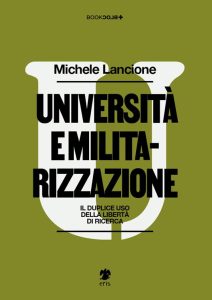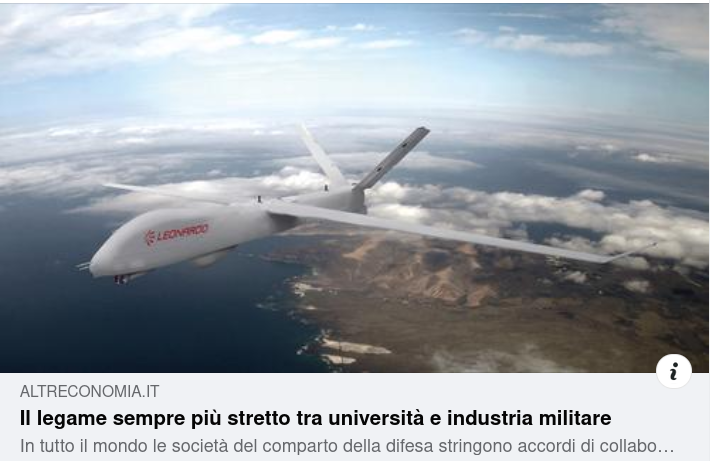The following interview, about my book “Universitá e Militarizzazione” (Eris 2023), appeared in the pages of Altreconomia in Italian. I have translated it here in English, using an automated translator.
Thanks to Luca Rondi for the interview, and for Altreconomia for supporting the struggle (since the very beginning, when it was all about Frontex!)
The increasingly close link between universities and the military industry
By Luca Rondi – December 1, 2023
All over the world, companies in the defense sector enter into collaborative agreements with universities, at the risk of distorting the purpose of research. A phenomenon that also concerns Italy, starting with the Leonardo case
Taken from Altreconomia 265 – December 2023
“Think of when you add oil to a glass of water: if you drink it, the taste changes despite the fact that to the eye the two substances are divided from each other.” Professor Michele Lancione has no doubt: the sweet taste of research freedom has already been spoiled as more and more universities, Italian and otherwise, are interconnected with the military sphere. And in the book “Universities and Militarization,” published by Eris editions in October 2023, Lancione proceeds analytically to reconstruct why these relationships are problematic. He does so starting with an emblematic affair that concerned him personally (the department he works for at the Polytechnic University of Turin is producing maps for the controversial Frontex agency) and then widening his gaze to other collaborations of Italian and foreign universities, from the United Kingdom to Australia to the United States. We interviewed him.
Professor Lancione, let’s start with the title. What do you mean by “militarization”?
ML I mean it in the broadest possible sense, which therefore goes beyond the strictly material aspect of the term as may be the occupation of public land for military uses. I am therefore referring to that process, which we have witnessed in the West from September 11, 2001 onward, whereby what is not military is transformed into military. I start with a trivial example: how often in everyday language do we use war terminology? Words like “assault,” “firepower,” “battle.” This is the result of a paradigm shift that has fostered the spread of a culture of war and that unfortunately continues to increase, not least because of what happened first in Ukraine and then in Palestine.
You review several cases of problematic agreements between universities and companies in the military-industrial sector. Can you give us some examples?
ML First of all, we need to dispel the myth that only certain disciplines are affected by this phenomenon, even the social sciences are. In the book I bring the example of the “human terrain system” promoted by the U.S. Department of Defense to study the “human terrain” in the “War on Terror” carried out in Iraq and Afghanistan with the aim of improving outcomes. In that case the figures involved were not engineers or computer scientists but anthropologists, political scientists and geographers who were even involved on the battlefield. This is the most extreme example of where the interference of the military sphere in research has gone. The same one we find, this time in Italy, in the agreements with the Med-Or foundation and its main player, Leonardo Spa. Several Italian universities have made agreements with the company to foster, so they say, a culture of exchange and knowledge. The word “synergy” is often used: it sounds harmless but it is not, because it means bringing together worlds that previously did not talk to each other, exchanging experiences, creating social relationships. And it doesn’t matter if the purpose of the project is civilian: not least because these collaborations today are part of a troubling bigger picture.
Which one?
ML In 2022, a National Military Research Plan (NPRM) was launched by the Ministry of Defense, which aims to “increase the knowledge base of the Defense in high-tech sectors.” On the one hand there are universities and private individuals coming together for “civilian” purposes, and on the other hand a ministry offering money to do research on defense-related fields.
You have already cited Leonardo. It especially delves into his connection with the Polytechnic University of Turin, the university where you teach. Why?
ML Because Leonardo in Turin has slowly become what Fiat was in the past. An industrial partner of reference to which one becomes more and more attached. Mind you: there is nothing illegitimate, much less illegal in this. It is a genuine interest, if you will, of a university that needs the validation of a company to demonstrate the concrete results that its knowledge produces. Just as legitimate is the interest of the company that gains on two counts: it justifies its image because it collaborates with one of the most prestigious universities in the world and, above all, it has the opportunity to access knowledge that is fundamental to its business. This dynamic is trivial, but that is precisely the problem, and I would go so far as to say that it is reminiscent of Hannah Arendt’s banality of evil. Because this connection risks the university losing its nature: Leonardo works to make a profit and does not have to ask ethical questions about what it produces (making weapons is its business) but for the Athenaeum it does not. And the question we forget to ask ourselves is this. How will you, from an institutional point of view, take a stand on certain issues-I think of wars and armaments-if your partner, with whom you may have built entire areas of research and teaching, as in the case of Leonardo, which runs a master’s program at the Politecnico di Torino, feeds that same system? And the more you tie yourself financially to these entities, the more you are stuck.
Is that what happened with the “Frontex case”?
ML In my opinion, yes. One did not have the courage to get out of that agreement because it would cascade into so many others. But there is more. The contract for the production of up-to-date cartography with the European Border and Coast Guard Agency is still in force despite the fact that the Academic Senate decided to save it, twice, only with the specific provision of the inclusion of a human rights safeguard clause that committed both parties. Beyond the impossibility of checking what Frontex does with the maps, Altreconomia had discovered in February 2022 that the same clause had never even been seen by the agency, because it was not included in the framework contract, but only in the agreement between the three Italian parties in the consortium that won the tender. And it’s paradoxical: you are so overwhelmed by the flow that you are completely disinterested in the consequences of your actions: you decide to insert a clause, Frontex doesn’t even know what it is, but that’s okay.
Do these dynamics you recount happen only in Turin?
ML No, in a great many Italian universities.
The agreements, however, often, at least on paper, are for civilian purposes. Is this not enough?
ML Not only is it not enough but it is an intellectually dishonest excuse. Let me explain: when we take refuge behind the label of dual use we block any kind of discussion at the origin. After all, the Gps we have on our smartphones comes from military studies, so what’s the harm? We all use it today. But beware. I take the example of water and oil again: the entities-university and company-remain separate but the relationship that is created is very intense. And I would add: perhaps, if Leonardo did not collaborate with ninety universities and research centers around the world, it would not be the leading European manufacturer of aerospace-related armaments. For that knowledge that the university gives it (for example, on photovoltaic panels for robots sent to Mars) also gives the company an advantage on the other front. It is that exchange of knowledge we were talking about earlier. And especially of money.
How much does the economic aspect affect it?
ML A lot. Because that area is in danger of becoming a major form of funding for entire departments. And that is dangerous because if the company closes the taps, you risk not standing anymore.
Is the university, therefore, being distorted?
ML The ability to think of universities as a place where you need to take public positions on important issues has been lost. And on this abroad they are ahead of us. Rectors never take action on current events. And those who do, I think of Tomaso Montanari of the University for Foreigners of Siena, are ridiculed. But that’s his job.
Is this a problem only of the rectors?
ML Obviously not, but it affects because then in cascade everyone is more afraid. And let’s remember that in Italy the academic career is difficult and long: you are often forced to keep a low profile. For a researcher who needs the money to pay his rent, it’s complex to say no. And then I think there is also a strong organizational element: with a strong expression I once said that my colleagues are paper pushers. I mean this: if the council of a university just signs papers, lots of them in the few hours of the assembly, maybe without having read the papers in detail first, because they materially did not have time, there cannot be proper control. Neither can there be discussion.
To whom is the book addressed?
ML It can speak to many and many but I wrote it with my students in mind. I hope it is a useful tool to ask themselves questions and organize themselves to explore this issue. Especially at a time when war is ever closer to all of us.


